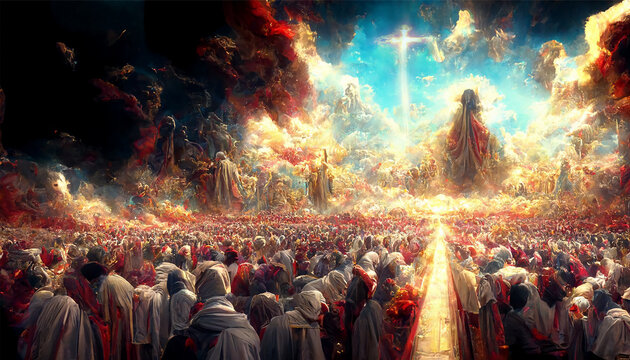Will the Judgement Day Ever Come According to Religious Believe?
 The concept of a Judgement Day – a time of final reckoning where humanity faces divine judgment for their actions – has permeated religious thought for millennia. Across various faiths, the details of this day may differ, but the core principle remains: a grand finale where good and evil are weighed, and destinies are determined. Let's delve into the diverse beliefs surrounding Judgement Day in major world religions.
The concept of a Judgement Day – a time of final reckoning where humanity faces divine judgment for their actions – has permeated religious thought for millennia. Across various faiths, the details of this day may differ, but the core principle remains: a grand finale where good and evil are weighed, and destinies are determined. Let's delve into the diverse beliefs surrounding Judgement Day in major world religions.
Abrahamic Religions: A Shared Vision of Judgement
Judaism, Christianity, and Islam, all Abrahamic religions, share a core belief in a future Judgement Day. However, each religion offers its own interpretation of the event's nature and purpose.
Judaism
Jewish beliefs on Judgement Day are not as explicitly defined as in other Abrahamic faiths. The concept is often interwoven with the idea of God's ongoing judgement throughout life. However, some interpretations suggest a final judgement where individuals are held accountable for their deeds.
Christianity
Christians believe in a Second Coming of Christ, which will usher in a period of judgement. The righteous will be rewarded with eternal life in heaven, while the unrepentant will face eternal damnation in hell.
Islam
In Islam, Judgement Day (Yaum al-Qiyamah) is a central tenet of faith. Muslims believe that all people will be resurrected and judged by Allah based on their deeds and faith. Paradise (Jannah) awaits the faithful, while hellfire (Jahannam) awaits those who disbelieved or committed grave sins.
In these Abrahamic religions, Judgement Day serves as a powerful motivator to live a moral life. The threat of eternal damnation and the promise of eternal reward encourage believers to adhere to the teachings of their respective faiths.
Eastern Religions: Reincarnation and Karma
Eastern religions often view existence as a cycle of rebirth, with Judgement Day replaced by the concept of karma.
Hinduism
Hindus believe in a cycle of reincarnation (samsara). Karma, the law of cause and effect, dictates the quality of one's rebirth. Following dharma (righteous duty) leads to a higher rebirth, while negative actions lead to a lower one. Moksha, liberation from the cycle of rebirth, is the ultimate goal.
Buddhism
Similar to Hinduism, Buddhists believe in karma and reincarnation. Following the Eightfold Path, a guide to ethical living, helps one achieve enlightenment and escape the cycle of suffering.
In these Eastern faiths, the concept of immediate judgment is replaced with a continuous process of self-improvement. Individuals strive to live righteously throughout their lives to achieve a better future existence or ultimate liberation from the cycle of rebirth.
Other Religious Perspectives: Diverse Eschatological Beliefs
Several other religions hold unique beliefs about the ultimate fate of humanity and the world:
Norse Mythology
Ragnarök, the twilight of the gods, signifies a cataclysmic battle that will destroy the world and many gods. However, a new world will emerge from the ashes.
Zoroastrianism
This ancient religion posits a final battle between good and evil, after which the righteous will dwell in a paradise and the wicked will be punished.
These examples showcase the diverse range of beliefs surrounding the end of times and the final judgment of humanity.
Interpreting the End: Symbolic or Literal?
The imagery surrounding Judgement Day can be vivid and dramatic. Fire, brimstone, and apocalyptic battles populate many religious narratives. However, some scholars interpret these descriptions metaphorically.
They argue that the core message is about moral accountability and the consequences of one's actions. Judgement Day, in this view, represents a spiritual awakening or a period of self-reflection where individuals evaluate their deeds.
The Enduring Allure of Judgement Day
Regardless of interpretation, the concept of Judgement Day continues to hold significance for religious adherents. Here are some reasons why:
Moral Compass: The belief in Judgement Day can serve as a moral compass, encouraging individuals to strive for good deeds and avoid wrongdoing.
Sense of Hope: For those who have suffered injustice, the idea of a final reckoning where the wicked are punished and the righteous are rewarded offers solace and hope.
Meaning and Purpose: Judgement Day reinforces the belief that life has a purpose beyond our earthly existence. It provides a sense of ultimate accountability within a grander cosmic narrative.
The concept of Judgement Day, whether interpreted literally or metaphorically, speaks to a fundamental human desire for justice, meaning, and a clear distinction between good and evil.
Conclusion
While the specifics of Judgement Day vary across religions, the underlying themes remain consistent: the importance of living a moral life and the belief in ultimate accountability.
While some interpretations of Judgement Day can be fear-inducing, the core message across many faiths is ultimately a call to action.
It encourages individuals to live righteously, treat others with compassion, and strive to make a positive impact on the world. Whether motivated by fear of punishment or the hope for reward, the concept of Judgement Day serves as a powerful motivator to be the best versions of ourselves.
The question of whether a literal Judgement Day will occur remains a mystery. However, the concept itself serves as a powerful reminder of the importance of living a meaningful and ethical life. As we navigate the complexities of our world, the lessons gleaned from diverse beliefs about Judgement Day encourage us to strive for a future where justice prevails and humanity flourishes.


































